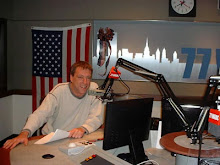
After losing my job at New York's WABC Radio last February, friends and colleagues often ask me, "how are you doing?" I tell them I'm in the "Happy to be Here Club." That's the place where many broadcasters find themselves these days. I'm happy to be working in a business I love, despite lower salaries in a glum economy. Shortly after Citadel cut mid-day talk show host John Gambling and myself in what was described in the industry as Black Friday, I was picked up as a news anchor at ABC News Radio. I'm not working full-time, nor I am I making that nice six-figure salary I was getting doing mornings on WABC for 12 years, but the network has been generous in the hours that they've allotted me.
A recent survey found that more than ever, Americans are in the category of "very insecure" with their current jobs. The Boston Consulting group found that 30 percent of Americans feel financially insecure, up from 28 percent in 2007. Five percent say they're now in financial distress. 39 percent say they feel they lack job security for the next year, up from 31 percent a year ago. The economy has forced cutbacks across the board. Radio has taken a huge hit. Almost every major broadcaster has cut jobs or streamlined. Holiday parties are gone. Expense accounts have been slashed. Hiring and pay freezes are common. The jobs of radio broadcasters are dependent on the sale of commercial time. But,advertising is a luxury and those sort of things are the first to go in client budgets.

The squeeze is on. When I started in radio just out of high school, you could find work at a small or medium market radio station, get your experience and move up the career ladder. It took me from Doylestown, PA to Allentown, to Denver, to San Francisco, Los Angeles and then New York. Radio stations in the larger markets paid pretty well. You could pretty much get what you asked for within reason. Stations hosted lavish parties for clients and staff. In Denver at the legendary KIMN radio, I remember being sent to a breaking news story at a ski resort. I was told to go to the business office, where they would set me up with a credit card to pay for all of my expenses. The lady pulled out a file stuffed with plastic. I was handed an American Express card and sent on my way. Because, I had little money and was caught with no winter clothes to cover an avalanche, I bought an entire ski outfit. I hired a guy with a snow cat to take me to the top of the mountain and was able to file reports from near the peak.
Now that I'm working in the largest market in the country, if I cover a story, I have to pay for it myself and expense it later. Frugal broadcasters continue to slash. For the first time in my career, I've come to the conclusion the days of big salaried on-air positions are over. Program Directors and News Directors who have often claimed the talent pool is top heavy with talentless applicants now say they're being inundated with experienced broadcasters who have found themselves downsized. Those that are currently employed are staying put, worried what the next job will bring. Two things are at play here: There's no farm club for young broadcasters to learn and grow and the talented, experienced big market voices are too expensive.

I often joke with colleagues at ABC Radio News, that some day, there will only be two news anchors, a man and a woman. They'll go into a studio and record a series of sentences, words, phrases and letters of the alphabet. A newsroom writer will put the script into a computer, which will then automatically time and record what the employee had just written. The end result will be a generic, computer generated voice delivering the news to the nation. I just hope I'm that voice! Sound crazy?
If you were to ask me five or ten years ago, if I thought that would be possible, I'd say, "Come on, it hasn't gotten that bad." But, it has. Radio's also losing its local personality, as broadcasters fire high priced local personalities in favor of low-cost syndication.
The responsibility of broadcasters in this recession is to be able to make cutbacks without destroying the sound of good radio. I can't tell you how many friends who aren't in the business have come up to me asking why certain radio stations, in markets, large and small, have taken the local out of "local radio." There are exceptions of course and many of them are small, family owned facilities that are fixtures in their communities. They may be the last hold outs of a worsening economy. I just hope that they will continue to set an example for the big guys who are pulling the strings on thousands of remaining radio stations around the country.







No comments:
Post a Comment
Got something to say.....say it now. Please be advised if your comment is crude, mean spirited or otherwize obscene or libelous, you won't see it. Otherwize, fire away and thanks for reading. George